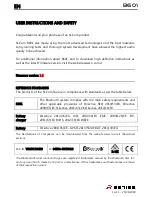
56
use and maintenance
ETV mille Caponord ABS
!
WARNING
P a y t h e u t m o s t a t t e n t i o n t o a n y
obstacle or variation of the ground.
Uneven roads, rails, manhole covers,
indications painted on the road surface,
building site metal plates become rather
slippery by rain. For this reason all
these obstacles have to be carefully
avoided, driving smoothly and leaning
the vehicle as little as possible.
Always use the turn indicators in time
when you intend to change lane or
d i r e c t i o n , a v o i d i n g s h a r p a n d
dangerous movements.
Switch off the direction indicators as
soon as you have changed direction.
Be extremely careful when you overtake
other vehicles or are overtaken.
In case of rain, the water cloud created
by big vehicles reduces visibility; the
air shift may make you lose control of
the vehicle.
RUNNING-IN
The running-in of the engine is essential to
ensure its duration and correct functioning.
If possible, drive on hilly roads and/or
roads with many bends, so that the engine,
the suspensions and the brakes undergo a
more effective running-in.
During running-in, change speed.
In this way the components are first
≈
loaded
∆
and then
≈
relieved
∆
and the
engine parts can thus cool down.
Even if it is important to stress the engine
components during running-in, take care
not to exceed.
NOTE
Only after the first 1500 km (937
mi) of running-in you can expect the best
performance levels from the vehicle.
Keep to the following indications:
◆
Do not open the throttle completely if the
speed is low, both during and after the
running-in.
◆
During the first 100 km (62 mi) put on the
brakes with caution, avoiding sharp and
prolonged brakings. This ensures a
correct bedding-in of the pads on the
brake disc.
◆
During the first 1000 km (625 mi) never
exceed 5000 rpm.
!
WARNING
After the first 1000 km (625 mi), have an
aprilia
Official Dealer carry out the
checks indicated in the column “After
running-in” of the regular service
intervals chart, see p. 62 (REGULAR
SERVICE INTERVALS CHART), in order
to avoid hurting yourself or other
people and/or damaging the vehicle.
◆
Between the first 1000 (625 mi) and
1500 km (937 mi) drive more briskly,
change speed and use the maximum
acceleration only for a few seconds, in
order to ensure better coupling of the
components; never exceed 6250 rpm
(see table).
◆
After the first 1500 km (937 mi) you can
expect better performance from the
engine, however, without exceeding the
maximum allowed (8750 rpm).
Engine maximum rpm recommended
Mileage km (mi)
rpm
0
√
1000 (0
√
625)
5000
1000
√
1500 (625
√
937)
6250
over 1500 (937)
8750
ETVmille_ABS_UK.book Page 56 Friday, October 24, 2003 12:25 PM
















































